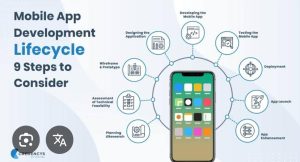Introduction to Flutter: The Complete 2025 Beginner’s Guide to App Development
App development (mobile)has rapidly evolved in the last few years, and in 2025, cross platform development toolkit continues to dominate as one of the most powerful frameworks for building cross-platform apps. Whether you are a beginner with no prior coding experience or an aspiring developer looking to expand your skills, Google AI toolkit provides an excellent way to build beautiful, fast, and reliable mobile applications for Android, iOS, Web, and even Desktop — all from a single codebase.
In this complete beginner’s guide, we’ll explore what cross platform development is, why it is so popular, how it works, and how you can get started with your first Google UI toolkit project in 2025.

What is Flutter:The Complete 2025 Beginner’s Guide to App Development?
Flutter is an open-source UI framework developed by Google. It allows developers to create natively compiled applications using a single programming language — Dart. Unlike traditional frameworks that rely on bridges between native components, Fr uses its own rendering engine to create fast and smooth UIs.
Key features include:
-
Cross-platform development: Write once, run anywhere (Android, iOS, Web, Desktop).
-
Hot Reload: Instantly see changes in your code without restarting the app.
-
Beautiful UI: Comes with a rich set of pre-designed widgets.
-
High performance: Apps run at near-native speed.
Why Choose Flutter in 2025?
Flutter has grown massively since its launch in 2017. By 2025, it is considered one of the most future-proof frameworks. Here’s why:
-
Single Codebase for Multiple Platforms
Instead of writing separate apps for Android, iOS, and Web, you can use one codebase to deploy everywhere. This saves time, money, and effort. -
Strong Community Support
With millions of developers worldwide, finding solutions, tutorials, and libraries is easier than ever. -
Backed by Google
Google actively maintains Croo platform development toolkit and uses it in products like Google Pay, Ads, and Stadia. This ensures long-term reliability. -
Rich Ecosystem
Thousands of packages and plugins are available to add features like Firebase integration, maps, authentication, and payments. -
Future of Cross-Platform Apps
In 2025, companies prefer cross-platform solutions to cut costs. Cross platform development toolkit stands out due to its native-like performance and adaptability.
Setting Up Flutter:
follow these steps:
Step 1: Install Flutter SDK
-
Visit the official Cross platform development toolkit website.
-
Download the latest SDK for your operating system (Windows, macOS, or Linux).
Step 2: Install an IDE
-
Android Studio, Visual Studio Code, or IntelliJ IDEA are recommended.
-
Install the Cross Platform development Toolkit plugin and Dart plugin.
Step 3: Run Flutter Doctor
In the terminal, type:
This checks if everything is set up correctly and shows missing dependencies.
Step 4: Create Your First Project
This will launch a demo app on your emulator or physical device.
Understanding the Basics of Flutter
Cross platform development toolkit apps are built using Widgets. In fact, everything in cross platform development toolkit is a widget — text, images, buttons, layouts, etc.
Example:
Here’s what happens:
-
main()runs the app. -
MaterialAppprovides the app structure. -
Scaffoldcreates a basic screen with an AppBar and body. -
CenterandTextdisplay content
Advanced Features for Beginners to Explore
Once you’re comfortable with the basics, you can move on to:
-
State Management: Learn about
Provider,Riverpod, orBloc. -
Firebase Integration: Add authentication, database, and cloud storage.
-
APIs: Fetch real-time data using HTTP or GraphQL.
-
Animations: Make your app more interactive and visually appealing.
Career Scope of Flutter in 2025
If you are learning Cross platform development toolkit in 2025, you are on the right track. Companies are constantly looking for developers who can build cross-platform apps efficiently.
Career benefits include:
-
High Demand: Startups and enterprises hire Cross Platform development Toolkit developers for cost-effective app solutions.
-
Freelancing Opportunities: You can build apps for clients worldwide.
-
Product Development: Build and launch your own apps on Google Play Store or Apple App Store.
Conclusion
Flutter in 2025 is not just a framework — it’s a complete ecosystem for modern app development. Its simplicity, speed, and flexibility make it ideal for beginners and professionals alike. By learning Cross platform development Toolkit today, you’re preparing yourself for one of the most in-demand skills of the future.
So, install, Cross platform development toolkit write your first “Hello World”, and take your first step into the exciting world of cross-platform Mobile development.
Learn more in our guide: Flutter Projects for Beginners
Read our tutorial of the](https://yourwebsite.com/flutter-first-app-tutorial) for a hands-on approach.
